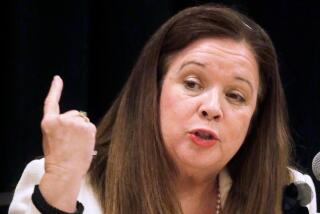Infighting Has Demjanjuk Defense in Disarray : Lawyers Exchange Accusations as They Prepare to Present Case in Israel Court
- Share via
JERUSALEM — The defense team in the war crimes trial of retired Cleveland auto worker John Demjanjuk was in disarray here Sunday, with his attorneys exchanging thinly veiled accusations of incompetence, collusion and publicity-seeking.
Longstanding tensions among the lawyers exploded into public recriminations following the revelation earlier in the weekend that Demjanjuk had signed a letter nearly two weeks ago informing the court that he was firing chief defense counsel Mark O’Connor, an American.
O’Connor, claiming he still has not seen a copy of the letter, told a crowded Jerusalem press conference Sunday that he is convinced his client “knows nothing of the implications of his act,” and he petitioned the court for a special session to air the matter.
In response, Chief Judge Dov Levin scheduled an extraordinary public hearing for Wednesday morning.
Possible Death Penalty
Demjanjuk, born in what is now the Soviet Ukraine, faces a possible death penalty if he is found guilty of being the sadistic World War II Nazi death camp guard known to his victims as “Ivan the Terrible.” He is only the second person to be tried here for war crimes. The first, 25 years ago, was Adolf Eichmann.
The uproar involving Demjanjuk’s attorneys occurs just two weeks before he is scheduled to take the stand as the first witness in his own defense.
O’Connor blasted his Israeli co-counsel, Yoram Sheftel, at the press conference and in a letter to the court delivered Sunday, suggesting that it was the Tel Aviv attorney who influenced Demjanjuk to take his action.
But the third defense lawyer, American John Gill, defended Sheftel and said in a telephone interview from his home in Cleveland that Demjanjuk’s family has named him--Gill--as the new chief attorney on the case.
Informed of Wednesday’s scheduled hearing by a reporter, Gill said it is important “that the court know exactly what is the position of the family and of the other attorneys involved.”
“Mark O’Connor has been fired,” Gill said. “He’s not the chief anymore. I’m the lead counsel now. I hate to sound so gruff on it, but that’s the way it is, and that’s the way it has to be.”
Gill said that O’Connor, a Buffalo, N.Y., attorney who has been involved with the Demjanjuk case for five years, was fired because he “was not doing the work that he was supposed to be doing.”
‘More the Spokesperson’
“Instead of interviewing and preparing witnesses that he was assigned to cover, he was not doing this. . . ,” Gill said. “It became more and more evident that Mark’s role in the case was more the spokesperson. . . .”
Gill also said that O’Connor did “whatever he pleased” in the courtroom despite Demjanjuk’s “specific instructions” that strategy and tactics be determined by a majority of the three-member defense team.
He said that it was “primarily” Sheftel who brought the situation to Demjanjuk’s attention, although he (Gill) also played a role. “I indicated some of the things I felt should have been done,” Gill told The Times.
Sheftel could not be reached for comment Sunday. Earlier in the weekend, he said that while he “fully welcomes” O’Connor’s dismissal from the case, he did not want to make any comment on the reasons behind it.
Demjanjuk signed the dismissal letter June 30, Sheftel said, but “we held it because we were hoping that O’Connor would get out of the country. . . . We wanted to avoid the disgrace that we’re going to have now.”
In his letter to the court and comments to the press Sunday, O’Connor referred repeatedly to what he suggested was the undue familiarity of the prosecution with defense strategy and movements, intimating that this was because of Sheftel.
He specifically mentioned a session in Judge Levin’s chambers last Wednesday during which prosecuting attorney Michael Shaked “appeared more informed about Mr. Sheftel, his whereabouts, and recent defense strategy than anyone in the room, or even Mr. Sheftel’s own secretary.”
O’Connor added that the prosecutor had made “various other statements . . . that had apparently been divulged to him by Mr. Sheftel or others related to the defense.”
Asked if he knew of any arrangement reached secretly between Sheftel and Shaked, O’Connor said, “No.”
Agreements Criticized
However, in his letter to the court, the text of which was disclosed by trial spokesman Yossi Hassin, O’Connor criticized agreements between the two men regarding the admission of evidence on which he said he had not been consulted.
“Having translated one such agreement, it is my opinion that it may prove harmful to the defense’s case,” O’Connor said. “It is entirely possible that this agreement was concluded by Mr. Sheftel based on a lack of in-depth understanding of this complicated international proceeding.”
Referring to Sheftel’s argument late last month that the prosecution had presented insufficient evidence to continue the trial, O’Connor added: “Mr. Sheftel’s ‘no case to answer’ argument, in which he implied that the honorable court had somehow been deceived by the prosecution’s non-existent case, speaks for itself in this regard. Nor can Mr. Sheftel’s earlier attacks on this court and its integrity and the propriety of this judicial proceeding be easily overlooked.”
O’Connor insisted that he is not contesting Demjanjuk’s decision--only trying to ensure that it was taken with a full understanding of its impact. He said that when he spoke with the 67-year-old defendant in his solitary-confinement cell Friday, “he was a man who was totally crestfallen; a man who was confused; a man who didn’t know what day it was.”
‘Moral Responsibility
O’Connor said it was his “ethical and moral and legal responsibility” to make sure that Demjanjuk is “informed by the court, and not by Yoram Sheftel, as to what he has to look forward to once I have left the defense team, and once Yoram Sheftel’s line of defense takes my place.”
The defense--which has been preparing its case since the prosecution completed on June 30--is expected to seek a postponement beyond the scheduled July 27 reopening of the trial. Judge Levin, however, has previously denied such requests.
“This is a very strange or even silly move to take at this stage,” trial spokesman Hassin commented on the impact of the latest events. “They forgot about the accused and his position, and they are fighting each other.”
More to Read
Sign up for Essential California
The most important California stories and recommendations in your inbox every morning.
You may occasionally receive promotional content from the Los Angeles Times.










